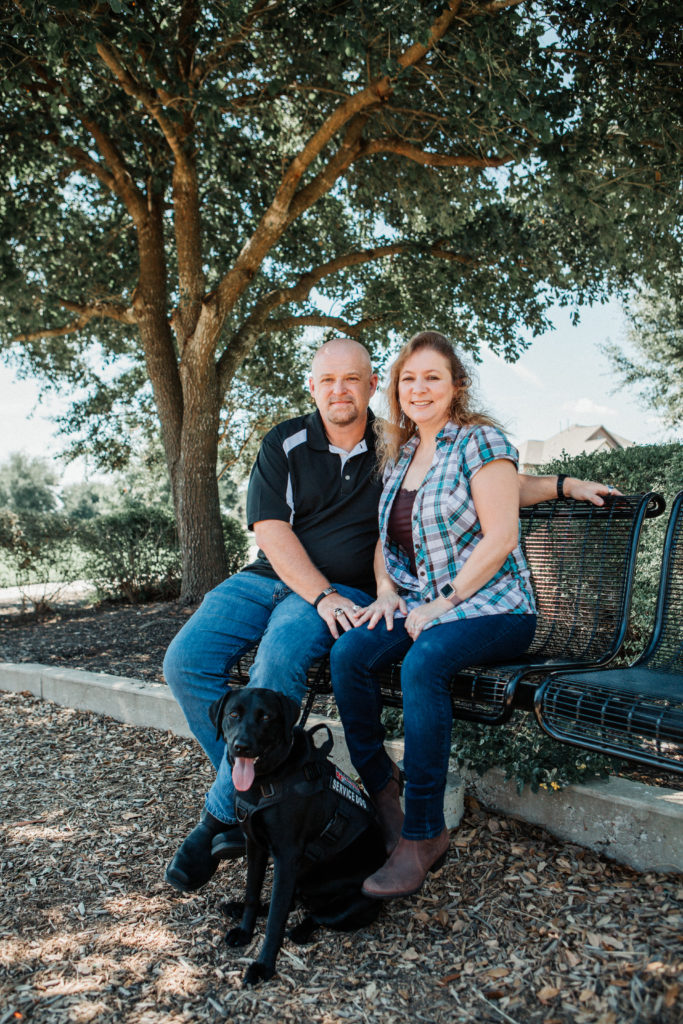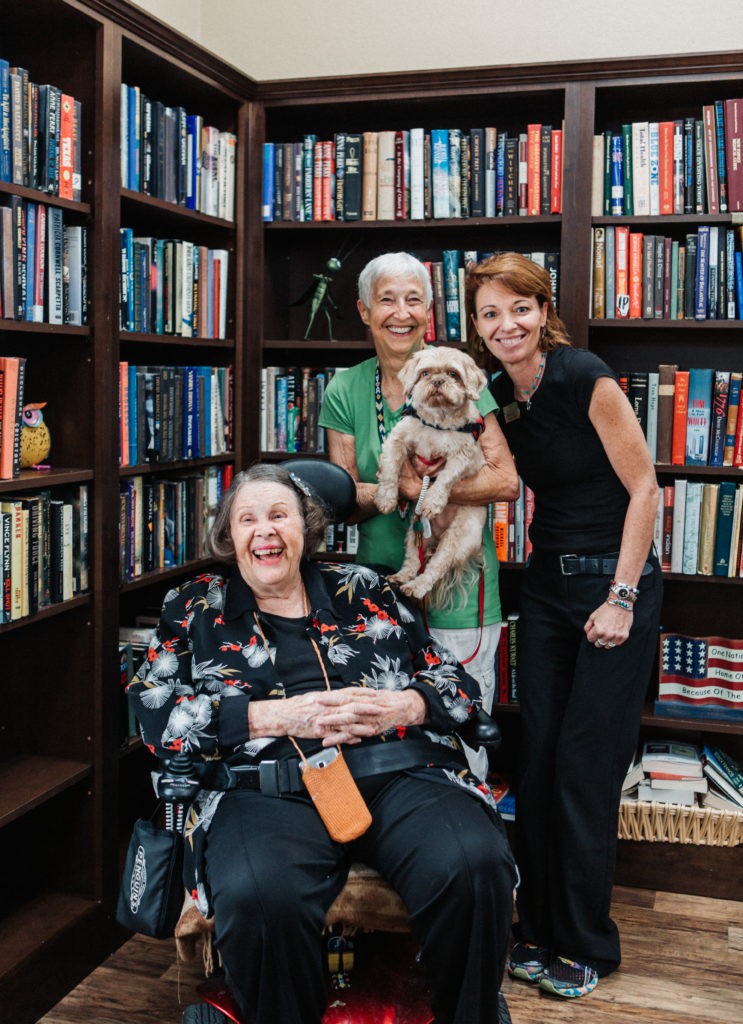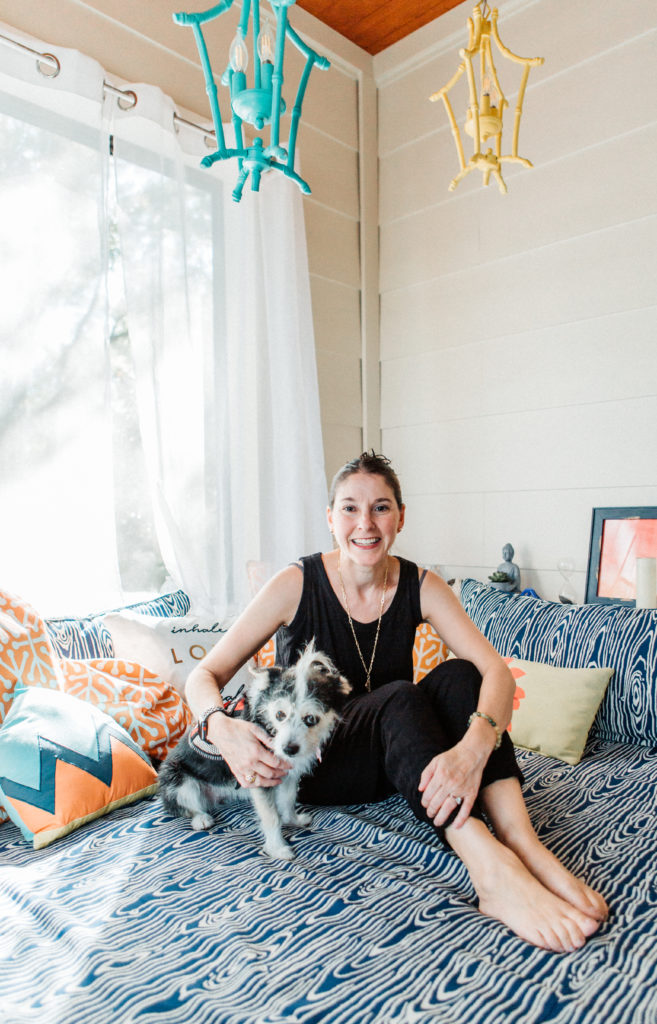Austin-based nonprofit The Dog Alliance trains and matches service dogs, therapy dogs and emotional-support dogs with Central Texans, bettering lives by harnessing the healing power of the pooch.
By Brianna Caleri, Photos by Taylor Prinsen
Everything is fun for woman’s best friend. From retrieving items to closing doors and providing physical support, a service dog is just playing a game that happens to change human lives. Debi Krakar, a certified dog trainer and the executive director of nonprofit The Dog Alliance, says the dogs love their jobs so much, she would never ask one to stay home all day.
The Dog Alliance makes service, therapy and emotional-support placements with 175 therapy teams in about 800 locations a year. Still, it can take years to find a match. It takes 14 to 20 months to train a service dog when starting with a puppy, and only about half make it all the way through to placement. At the finish line, those dogs are calm and responsive to their owners’ needs but not to random external stimuli. Having such selective focus helps relieve veterans of hypervigilance in public places and makes for fewer mishaps with inexperienced strangers, especially children, during therapy.
Service placement is free, and the wait is worth it. Any dog and recipient, trained or not, can benefit from each other’s company and the oxytocin (“love hormone”) released when spending time together. Dogs can also help people who experience trouble connecting with strangers by inviting a friendly connection, especially with other pet lovers, and trained dogs can understand when it’s more appropriate to use their presence as social and physical barriers. Even at home, dogs can take the pressure off spouses and family, who often carry emotional weight for loved ones with trauma.
Krakar recommends pet parents include a “stay” in their training: telling the dog to wait until he or she is released for food or to greet a friend, or used in any scenario that calls for a calm, quiet pet. Helping dogs learn self-control is a great first step to forging irreplaceable bonds like those shared by a mother, a wife and veteran, and a loving nursing-home community.
WORKING DOG SPECIFICATIONS
| Service | Access to no-pet housing, airplanes, full public access | Helps only their handler |
| Therapy | No legal protection to be in public places | Travels with their handler to help others |
| Emotional Support | Some legal protection to be in public places | Provides comfort to their handler |
Taffy
18 months | Labrador retriever | Service dog
Favorite duty: “She loves the positive pressure. She gets to go up on [Troy’s] lap, and he just loves on her and she loves that.” – Dagne Ameigh
Favorite place to go: “The backyard or the park, so she can fetch long-distance. Fetching is her high-value reward and her favorite thing.” – Dagne Ameigh
Best dog friend: “Loki. They even play fetch together. … Loki will initially retrieve the ball and then he’ll drop it midway so that Taffy can pick it up and bring it the rest of the way back.”
– Dagne Ameigh

Taffy is still a puppy, but her mom and skilled trainer, Dagne Ameigh, believed in her so much that she’s already doubled the skills she graduated training with. Ameigh and her husband, Troy Ameigh, started fostering and training German shepherds more than 15 years ago, gaining a reputation as the “big-dog people.” When The Dog Alliance finally introduced the couple to Taffy, Krakar and her team knew she would be in good hands, and Taffy went home early with Dagne Ameigh to finish her training.
Troy Ameigh is an Air Force mobility unit veteran. At times, he was an emergency medical technician and a medic, and he’s seen more hardship than he can talk about today. He was discharged with a traumatic brain injury and PTSD from an attack from behind. He met his wife—an honorably discharged Marine Corps veteran who left home for boot camp at age 17—on a blind date she kept canceling until one night when she forgot to call it off and supposed it was too rude and too late to bail. The couple has been together for 18 years and have raised five children, including a foster teen, in addition to taking in exchange students. Taffy has a brother too, a corgi named Loki. The Ameigh house is a busy place run by a family weary of trauma, including the loss of an 18-year-old son after a traumatic brain injury that was, as Dagne Ameigh puts it, “the straw that broke the camel’s back.”
Service dogs must demonstrate three skills before being placed, and Taffy’s were “behind,” which uses Taffy’s presence behind Troy Ameigh as a buffer to mitigate his hypervigilance; “positive pressure,” or sitting in Troy Ameigh’s lap; and “nudge,” which looks like Taffy asking for attention but is really an excuse for when Troy Ameigh is getting anxious and needs an excuse to leave. Now Dagne Ameigh is working with her on circling Troy Ameigh in public, waking him up from his night terrors, which she can detect from pheromones, and a building skill that teaches her to “touch” objects like light switches and her new toy, an automatic fetch machine.
Now Troy Ameigh can go to crowded places like H-E-B again, with Taffy watching his back. Dagne Ameigh gets more sleep. And most importantly, the family isn’t so burned out anymore. In many ways, Dagne Ameigh is relieved of her job as a “service human,” and can work with Taffy just because she loves it. Unlike other family members, Taffy knows when she’s on the clock, lying calmly with her vest on and immediately flopping over and wiggling when it’s unlatched.
“She is his dog,” Dagne Ameigh says, “but she’s still part of the family.”
Charlie Brown
4 years | Shih Tzu | Therapy dog
Favorite duty: “He likes to greet people. I think that’s his favorite thing, meeting new people. His goal in life is to meet every single person—and other dog too.” – Robert Tycast
Favorite place to go: “In the car. He wants to go someplace.” – Robert Tycast
Best dog friend: “The new dog, Buddy. Buddy outweighs Charlie by 6 pounds—50 percent of his weight. He’s a very gentle dog, and they wrestle. Charlie loves to wrestle.” – Robert Tycast

Four days a week at the Clairmont Retirement Community, residents gather at about lunchtime for a visit with a Bow Wow Therapy Dog sent by The Dog Alliance. Howard Hettleman, a resident known by other community members as incredibly quiet and terse, will make the rounds to remind everyone—in complete sentences—which dog will be visiting that day. Even though residents are used to interacting with pets at the Clairmont, where independent living is strongly encouraged, the therapy visits provide a uniquely trusted and concentrated experience.
Therapy dogs like Charlie Brown, a rescue pup that has overcome his separation anxiety with his loving owner, Robert Tycast, must pass exams to show they’re nonreactive and can be trusted to stay calm when well-meaning strangers make them a little uncomfortable. Tycast is present to read Charlie’s stress level, but his presence also provides some valuable social therapy. His overall role is to enable Charlie and the residents to have a great experience together.
Jane Cocke Perdue and Margaret Lynn Verhoeff are two social-butterfly residents who make appearances often at the Bow Wow Therapy Dog visits, when their busy schedules allow. The two writers have built insightful understandings of the practice through their own experiences and watching others, even acting as stewards for more reserved residents.
“Some residents will never do anything,” says Tina Bertelle, life-enrichment director, “but they’ll vicariously pet the dog when they see Jane petting the dog.”
Perdue is an animal lover who has shared her home with dogs, cats, birds and even one monkey. She points out that pet therapy is a great memory aid, both for residents struggling with memory issues and those who simply have very different lives than they used to.
“For me,” Perdue says, “the one that reminds me most of the dog that I love the best is my favorite. And that’s probably true of everybody.”
For Verhoeff, who has lived in different retirement communities, the program is about appreciating the present. Participating gives her opportunities to meet other residents. She made one friend because she loved walking behind her dog, who moves like a “prima donna.”
Just being near a dog invites cheerful social connections. Tycast points out that even the residents who don’t want to pet Charlie do smile and wave, and he rolls the dog in his stroller into the rooms of residents who don’t often, or can’t, leave.
Because Bertelle believes so much in pet therapy, she always makes sure there’s something on the big TV in the recreation room, often a calming fish tank. She wants to be sure the room is welcoming, even when it’s empty.
“All of a sudden,” she says, “you’re not alone.”
Adell
3 1/2 year | Terrier mic | Service dog
Favorite duty: “She just loves to come along wherever my son goes, whether it’s shopping or going to get ices or a cookie or whatever. She just loves going wherever he goes.” – Tami Esson
Favorite place to go: “I would say her favorite thing would be to go to the dog auditorium and run around with all the dogs off leash.” – Tami Esson
Best dog friend: “[My mother-in-law] has a small female dog, and at first…Adell wanted nothing to do with her. The next day, I don’t know what happened, but they became besties.” – Tami Esson

Everyone loves Adell, but she is devoted to one boy only. Tami Esson’s 13-year-old son has such a hold on the dog’s heart that she sits stoic in his room for most of the day when he’s off at school. The two met when Esson was in search of solutions, hoping to reduce the effects of the boy’s avoidant/restrictive food intake disorder, or ARFID, and nine months after the introduction, his mother hesitates to say whether he even still has it.
ARFID encompasses unspecified food issues caused by general anxiety and sensory-processing challenges that can lead to malnourishment. Esson’s friend suggested a service dog, but she couldn’t see herself getting one, and her child was terrified of dogs. As her son got sicker, Esson recognized a gut feeling and realized he was not in a position to decide to take a risk for himself. She started talking to The Dog Alliance, but her son was hospitalized a month or two later. It took a year and a half to find Adell, whose calm devotion has even warmed her human boy up to off-leash dog parks, a total departure from his previous life.
If not for her little paws clicking across the floor, it would be difficult to tell Adell apart from a stuffed animal. As Esson talks, she strokes Adell gently for so long, it seems like a reflex.
“There’s some days that I don’t even realize I have a dog,” Esson says.
It’s not easy for a middle schooler to assume full responsibility for a pet, let alone his own anxiety. But Esson was surprised Adell’s walks, meals and grooming were taken care of without her having to ask. The teen and Adell were trained together by The Dog Alliance once or twice a week for months, plus school visits. Since Adell is mostly off school duty for now, Esson takes her out for morning walks.
Adell’s specialty is managing the boy’s anxiety just by being present. In a stressful environment for him, a restaurant, for instance, Adell sits under the table and distracts him. Sitting on his belly when there’s more room, she’ll even provide a few pounds of deep compression. Mostly, she helps ease his feelings of anxiety.
MEALS ON WHEELS: PALS
Meals on Wheels Central Texas has been delivering meals to homebound clients since 1972 and expanded to offer home repairs, veteran services and more. Making sure no pet is left behind, the nonprofit organization’s Pets Assisting the Lives of Seniors program adds pet food to the menu. In addition to making deliveries, special PALS volunteers drive pets to free vet visits and to get grooming services, both provided by organization partners. Trap-neuter-release services are provided for community strays.
Home visits do more than provide food and convenience.
“The majority of our pet-owning clients live alone, so they really count on their dogs and cats for companionship, love and purpose,” says program manager Heather Allard.
The animal-loving volunteers offer some human relief from the social isolation of living alone, getting to know clients and their pets, trading stories and bonding about a common passion.
PALS always accepts donations, including all brands of pet food, gently used or extra supplies and even holiday gifts that will be wrapped and delivered this winter.


